You might find it fascinating that crocodiles are among the most ancient animals still roaming the Earth today, with some species boasting lifespans that rival those of humans. Consider the saltwater crocodile, which can live up to 70 years in the wild—sometimes even longer under the right conditions. What’s intriguing is how these creatures manage to survive decades in such harsh environments. Factors like diet, habitat quality, and the level of human interference play a significant role. But what’s even more compelling are the exceptions to these rules and what they can teach us about longevity and survival. How do these factors interplay to push the boundaries of their lifespan? What can studying their longevity reveal about our own?
Key Takeaways
- Saltwater crocodiles can live up to 70 years in the wild.
- Captive crocodiles often exceed their typical lifespan, reaching 100-120 years.
- The oldest recorded crocodile, Freshie, lived up to 140 years in captivity.
- Environmental factors and stable conditions in captivity can extend crocodiles’ lives.
- Crocodile longevity varies by species, with larger types generally living longer.
Understanding Crocodile Longevity
Exploring crocodile longevity reveals that these reptiles can live exceptionally long lives, with some species thriving for up to 70 years in the wild. You’ll find it fascinating how the saltwater crocodiles, known as the largest crocodile species, exemplify this durability. Their robust size and efficient metabolism not only allow them to dominate their aquatic habitats but also contribute to their lengthy lifespan.
Saltwater crocodiles, often seen as the epitome of reptilian survival, face fewer natural predators due to their formidable size and strength. This advantage naturally extends their life expectancy in the wild. In captivity, where threats are minimized and health is regularly monitored, these crocodiles can surpass their typical lifespan. The recorded oldest crocodile, affectionately named Freshie, lived up to 140 years in a protected environment, showcasing the potential longevity these creatures can achieve under ideal conditions.
Understanding the lifespan of these ancient reptiles, particularly the saltwater species, gives you insight into the remarkable adaptations and evolutionary success that crocodiles have achieved over millions of years. It’s not just about their fearsome reputation or their size; it’s about the intricate balance of their biological design that promotes longevity.
Species and Lifespan Differences
Diving into the differences between species, saltwater crocodiles generally outlive their freshwater counterparts, often reaching up to 70 years in the wild. You’ll find that the saltwater crocodile, with its robust size and formidable metabolism, stands at the top of the lifespan ladder within the crocodilian family. In contrast, the freshwater crocodile, though slightly smaller, typically manages a lifespan of 40 to 60 years.
The reason behind this significant difference isn’t just about size; it’s also linked to their respective lifestyles and biological makeup. Larger crocodiles like the saltwater species have slower metabolisms, which means they tend to age more gradually than their smaller relatives. This slow pacing in bodily functions contributes to their impressive longevity in the wild.
Furthermore, in captivity, where threats are minimized, both species can see an even greater extension of life. It’s not uncommon for captive crocodiles to reach 100 to 120 years, with exceptional individuals like Cassius, a renowned saltwater crocodile, surpassing typical age expectations. This extended lifespan in captivity underscores the impact of controlled environments free from predators and disease, coupled with the presence of beneficial gut microbes that support their health by boosting nutrient absorption and fighting off potential illnesses.
Environmental Influences
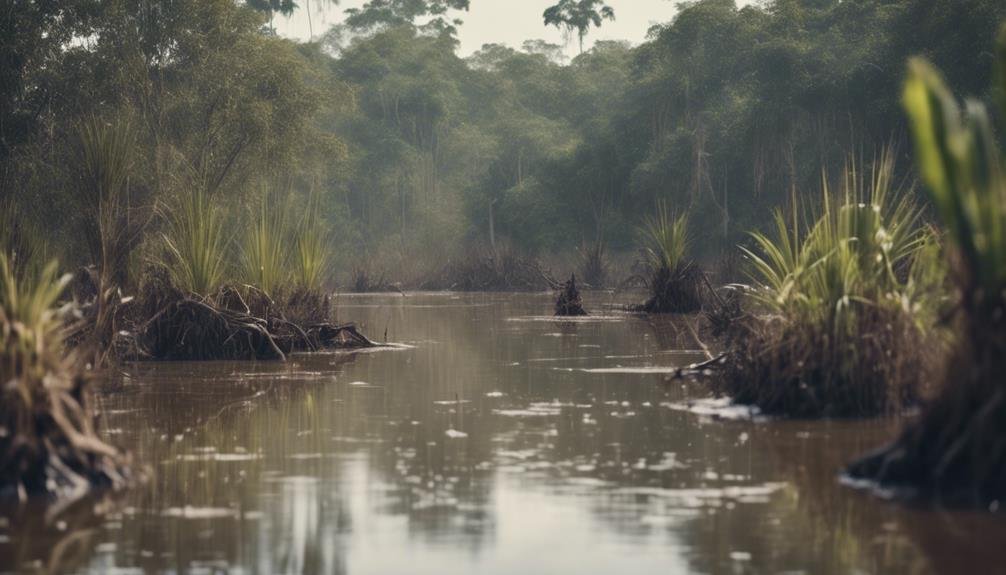

While the genetic makeup and species type play pivotal roles in determining a crocodile’s lifespan, environmental factors such as temperature and habitat quality also have significant impacts. For instance, the largest crocodile species might’ve the potential for an impressive maximum lifespan, but if they’re stuck in polluted or rapidly changing habitats, their longevity could be severely cut short.
You’ll find that changes in water levels, whether from drought or flooding, can drastically alter the living conditions for these reptiles, influencing not only their growth and health but also their ability to reproduce effectively. Pollution and habitat destruction, often a result of human interference, are major threats that can reduce their lifespan. Imagine a scenario where industrial waste contaminates the waterways that are home to these ancient predators, or expansive urban development encroaches on their natural environments.
On the flip side, crocodiles in captivity often escape these environmental influences. They’re provided stable conditions which can lead to longer, healthier lives. Additionally, active conservation efforts aimed at preserving natural habitats and minimizing human impact play an important role. These initiatives not only help maintain ecological balance but also support the health and longevity of crocodile populations globally.
Diet and Nutrition Impact
Crocodiles’ diet, consisting mainly of fish, waterfowl, and mammals, plays an essential role in their metabolic efficiency and overall health. You’ll find that what they eat not only fuels them but also impacts how effectively they use that energy. Particularly for larger crocodiles, maintaining a diet that supports the stability of body temperature is critical. This stability aids in better digestion and more efficient energy utilization, which is important for their survival and longevity.
As a young crocodile, you’d start off feeding on insects, crustaceans, and small fish, gradually shifting to larger prey as you grow. This shift is important as it supports your developing body and the increasing energy demands of a larger physique. Here’s how the dietary stages impact different aspects of your life:
| Age Stage | Diet Type | Impact |
|---|---|---|
| Juvenile | Insects, crustaceans, small fish | Supports growth, increases metabolic efficiency |
| Adolescent | Small to medium fish, some mammals | Enhances energy utilization, supports larger body size |
| Adult | Larger fish, waterfowl, mammals | Maintains body temperature stability, maximizes metabolic efficiency |
Adapting to environmental changes might also see you digging burrows to protect yourself and make sure you have access to these essential food sources.
Predation and Survival Rates
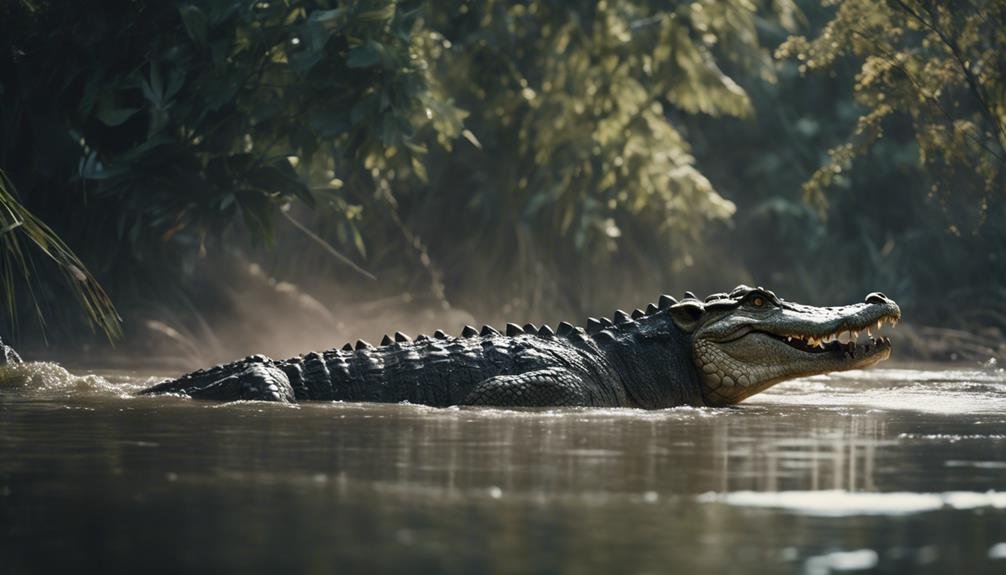

As you mature, understanding how predation and survival rates affect your life as a crocodile becomes increasingly important. From the moment you hatch, you’re thrust into a world where only the fittest survive. Predation is a constant threat, and your survival rates aren’t in your favor initially. As a hatchling, you face a challenging reality—only about 1% of your peers make it to adulthood. This high mortality rate is due largely to predation and various environmental factors that challenge your early life.
Your aggression plays a pivotal role in your survival. As you grow, this characteristic becomes a valuable asset, helping you ward off potential threats and secure your place atop the food chain. Your size eventually acts as a deterrent to most predators, boosting your chances of survival significantly.
Additionally, your species has evolved sophisticated survival strategies. You’ve mastered stealthy hunting techniques and developed efficient ways to store energy, ensuring you can endure periods of scarcity. These adaptations are essential, allowing you to thrive in diverse and often harsh ecosystems. With these skills, you gradually enhance your predation success rate—catching prey in up to 75% of your hunting attempts—and solidify your status as a formidable predator in your environment.
Health and Disease Factors
Understanding the impact of health and disease factors is essential for maximizing your longevity as a crocodile. As a crocodile, your lifespan can dramatically vary based on numerous health-related conditions. In the wild, you might live up to 70 years, but with peak health management, captivity could extend your life to 100-120 years. It’s important to take into account how your environment and care affect your health and, subsequently, your lifespan.
Your size plays a significant role in determining your lifespan; larger crocodiles like you often enjoy longer lives due to greater metabolic efficiency. This efficiency helps you manage your energy and health more effectively. Additionally, the microbes residing in your gut, such as Actinobacteria and Firmicutes, are crucial. They not only provide you with essential nutrients but also release chemicals that combat cancer, boosting your longevity.
To guarantee a long and healthy life, it’s essential that you’re kept in a stress-free environment with proper care. Regular health assessments are crucial. These check-ups can prevent diseases and address any health issues early, greatly contributing to your overall wellbeing. Remember, despite common beliefs, crocodiles do age, and how you manage these aging processes plays a critical role in how long you’ll thrive.
Age Verification Methods
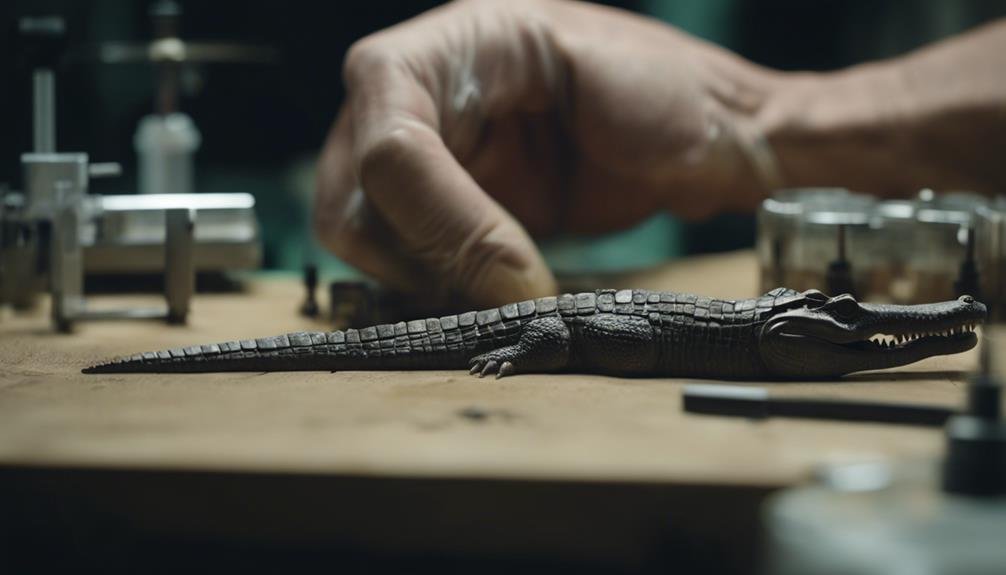

To guarantee you’re accurately informed about your age, several reliable methods are employed by scientists. First, they look at growth rings in your bones, much like you’d check rings in a tree trunk. Each ring typically represents a year of your life, providing a visual history of your age. But that’s not the only trick up their sleeves.
Scientists also examine the eye lens layers, which, you guessed it, form annually. By counting these layers, they can tell how many years you’ve been around. It’s a bit like peeling an onion, each layer offering clues about your past.
Lastly, let’s talk about stable isotopes. These are found in your tissues and tell a story about the changes in your diet and environment over the years. By analyzing these isotopes, researchers can piece together how long you’ve lived, considering the changes you’ve experienced.
Conservation Efforts
Conservationists are actively safeguarding crocodile habitats from destruction and pollution to guarantee their survival. They’re also implementing breeding programs that help increase crocodile populations. These programs often involve raising crocodiles in controlled environments and later reintroducing them into the wild, ensuring an increase in their numbers without the immediate pressures of the wild environment.
Moreover, efforts to mitigate human-crocodile conflicts are essential. These conflicts typically arise when crocodiles encroach on human settlements or vice versa. By educating communities living near crocodile habitats about behavior and safety measures, conservationists are working to reduce negative interactions. This not only protects human lives but also prevents the retaliatory killing of crocodiles, which can have a significant impact on their populations.
Additionally, the monitoring and regulation of trade in crocodile products play an important role. By keeping a close eye on this trade, authorities can prevent the illegal hunting and trading of crocodiles, ensuring that all trade is sustainable and doesn’t threaten their survival. Research into crocodile behavior and ecology further informs these conservation strategies, providing the necessary data to tailor protection efforts effectively.
Does the diet of crocodiles affect their lifespan?
Crocodiles’ diet and eating habits directly impact their lifespan. A balanced diet of fish, birds, and mammals ensures their long-term health and longevity. In captivity, a regulated diet can extend their lifespan to over 70 years. However, in the wild, environmental factors also play a significant role.
Captivity Vs. Wild Lifespan
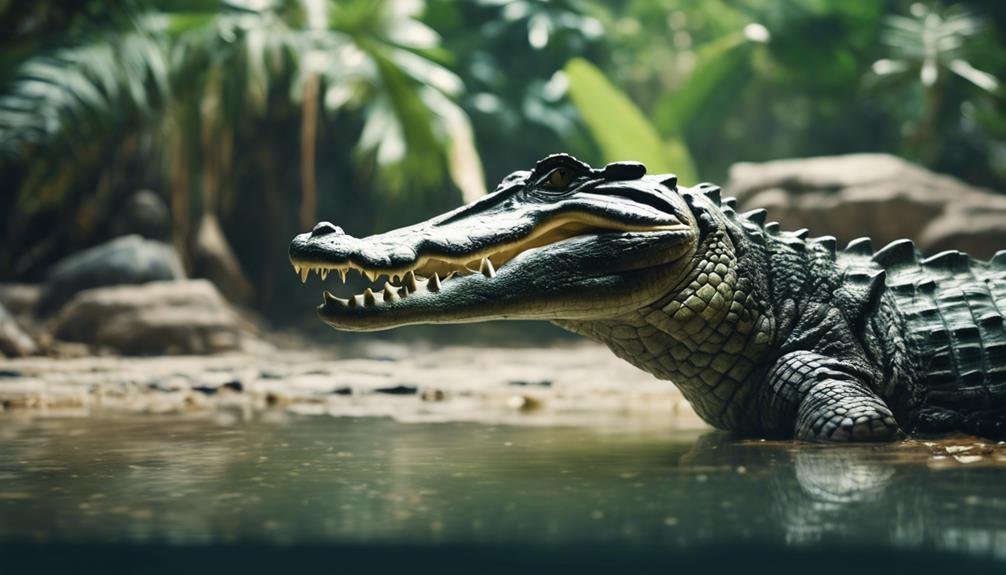

Crocodiles in captivity often outlive their wild counterparts, with some reaching ages between 100 and 120 years. This stark contrast in lifespan is primarily due to the controlled environments you find them in. Unlike their wild brethren, captive crocodiles aren’t battling for food, avoiding predators, or dealing with habitat destruction. They receive regular health checks and medical care, greatly reducing mortality from diseases or injuries.
Consider the Saltwater Crocodile, one of the largest and most formidable of its kind. In the wild, it faces numerous challenges that can curtail its lifespan; however, in captivity, these giants are known to thrive and live much longer.
Here are some key points to keep in mind:
- Controlled Diet: In captivity, crocodiles are fed a balanced diet tailored to their needs, enhancing their health and longevity.
- Medical Care: Regular veterinary care helps prevent diseases that might otherwise be fatal.
- Safe Habitat: Protected from natural predators and environmental hazards, captive crocodiles can grow older without the usual stresses of the wild.
- Consistent Climate: Controlled climate conditions in captivity prevent extreme weather from affecting their health.
- Monitoring & Research: Ongoing monitoring and research in captivity provide insights into their health needs and adaptations to promote longer life.
Understanding these factors can give you a deeper appreciation of why captivity might extend the lifespan of these ancient reptiles.
Conclusion
You’ve learned that crocodiles, especially saltwater species, can live up to 70 years in the wild, and even longer in captivity, like Freshie who hit 140 years. Their lifespan hinges on factors like genetics, diet, and habitat.
To guarantee these magnificent creatures thrive, conservation is key. By understanding their needs and protecting their environments, you’re helping preserve their populations for generations to come.
Remember, every effort counts in extending the lives of these ancient reptiles.

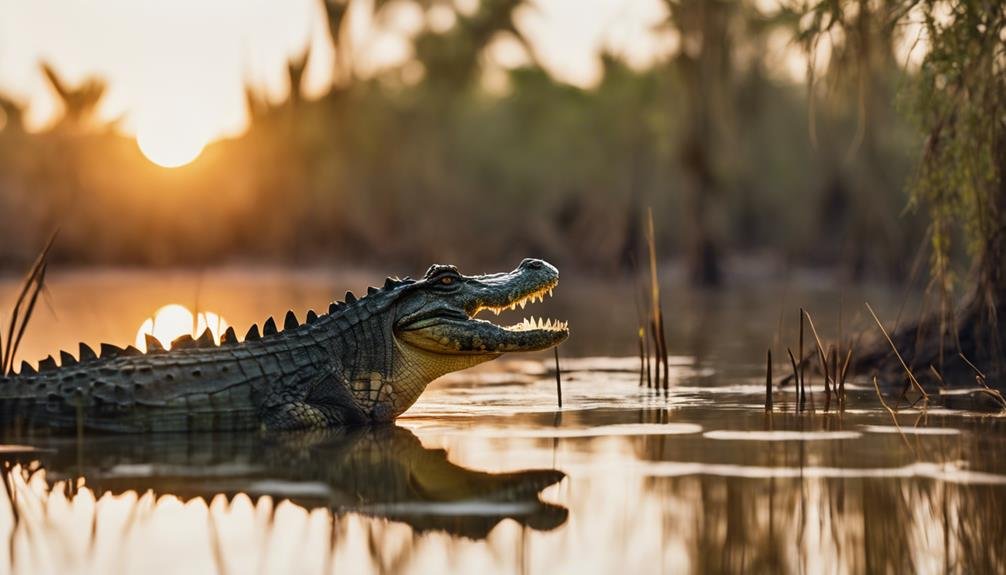

[…] years in the wild. Factors such as habitat, food availability, and human interference can affect how long crocodiles live, but both alligators and crocodiles generally have similar […]